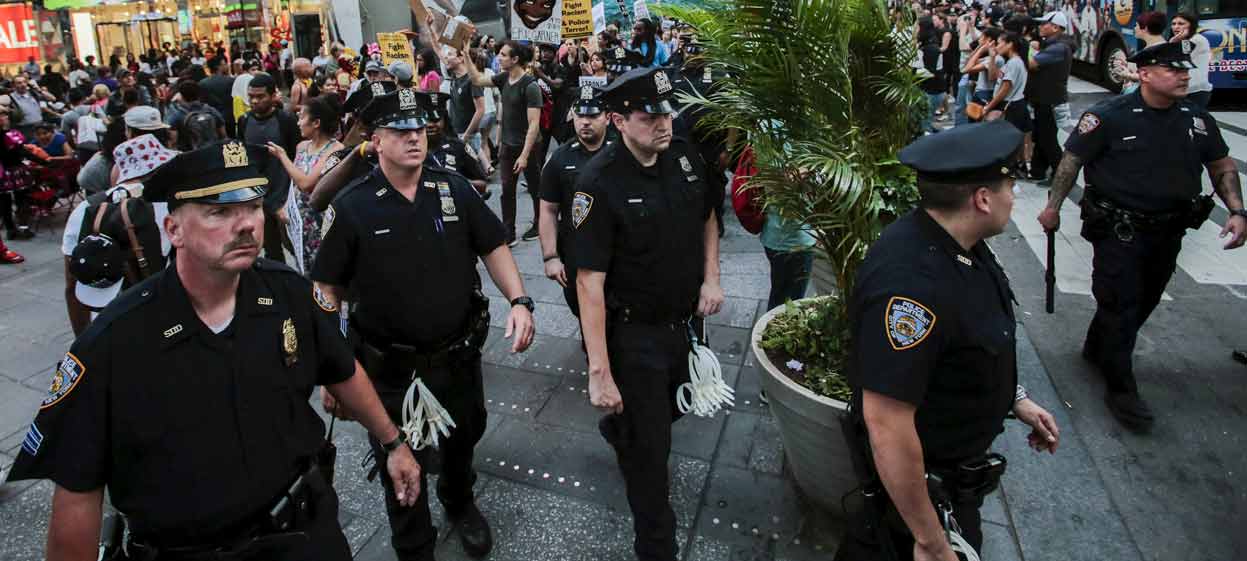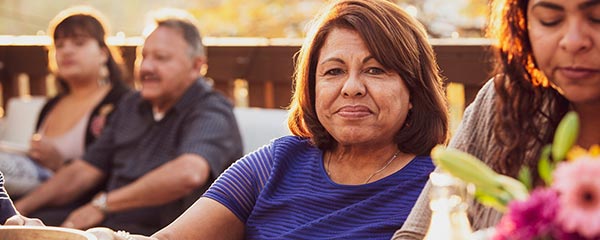Story Highlights
- 52% of blacks say police treat minorities fairly; 48% unfairly
- More blacks than whites, Hispanics want greater police presence
- Those who see unfair treatment split over need for more cops
WASHINGTON, D.C. -- Black Americans are divided over whether their local police treat racial minorities, including blacks, fairly or unfairly. Fifty-two percent of blacks say local police treat these minorities "very fairly" or "fairly," while 48% say the police act "unfairly" or "very unfairly." In contrast, 73% of national adults, 71% of Hispanics and 78% of whites say the police treat racial minorities fairly.
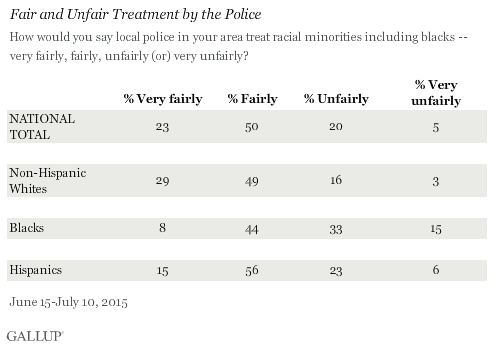
In the wake of high-profile incidents in the past year, including police action involving black Americans in Ferguson, Missouri, Staten Island and Baltimore, Americans have been accustomed to more media portrayals of alleged police brutality. Numerous black Americans have discussed their treatment by police, shining a light on an issue that has been gaining prominence in recent years. This is the first time Gallup has asked this question, so it is not possible to know whether these attitudes have changed from the past. However, prior Gallup research shows that blacks' confidence in police is a bit lower over the past two years, and that more broadly, nonwhites' views of police officers as honest and ethical declined sharply last year.
More Blacks Than Whites Want Greater Police Presence
The Minority Rights and Relations Gallup survey conducted June 15-July 10, which included an expanded sample size of blacks and Hispanics, reveals that Americans have complex views of how police treat minorities and whether there should be a greater police presence in communities. More blacks (38%) say they want a greater police presence in their local communities than do whites (18%) or Americans more broadly (23%).
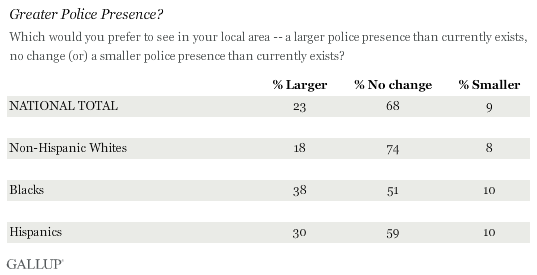
In general, though, majorities of these major groups profess wanting "no change" in the police presence in their local community. However, blacks are the least likely to say this at 51%, compared with Hispanics at 59% and whites at 74%. Only small percentages of any group say they want a smaller police presence than currently exists.
Those Who Believe Minorities Treated Unfairly Split Over More Cops Needed
Americans who believe minorities have been treated unfairly are somewhat divided over whether there should be a greater police presence in their local communities. Nationally, 73% of adults who believe racial minorities are treated fairly by police say they want the same amount of police officers in their communities, but this drops to 53% among those who think minorities are treated unfairly. Thirty-one percent of the latter group want an increased police presence.
Most blacks who believe racial minorities are treated fairly by police prefer the police presence be kept the same (59%), while 33% want a larger police presence where they live. However, African-Americans who say police treat minorities unfairly are divided, with 44% saying they want more police officers and 42% saying they want the same amount of cops in their local area. And U.S. Hispanics feel similarly to blacks -- 39% who say minorities are treated unfairly want greater police presence, and 40% want the same.
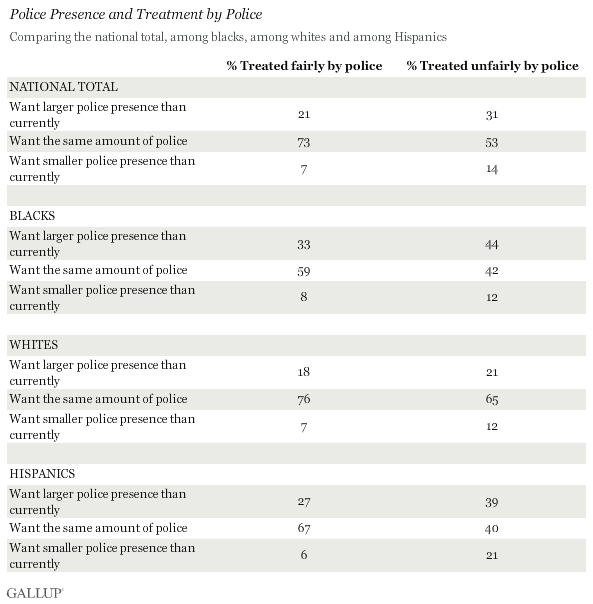
It is telling that among all groups -- blacks, whites, Hispanics and overall national adults -- who believe minorities have been treated unfairly, relatively small percentages want a smaller police presence in their local communities. This could mean that despite high-profile incidents, Americans recognize that police are needed in their area.
This suggests that while Americans who think minorities are being treated unfairly may want an increased police presence, it is unclear whether they mean more manpower in their communities or perhaps different types of officers, in demeanor or racial makeup.
Bottom Line
Previous Gallup analysis shows that blacks do not feel more mistreated in dealings with police in the last 30 days than they did when asked the same question in 2013. However, when asked a more general question, African-Americans are divided on their opinions about whether police treat minorities, including blacks, fairly or unfairly. Whites are more likely to say police treat racial minorities fairly. As calls for police reform in certain segments of the population continue, it is interesting that Americans are not calling for less of a police presence, but rather, either the same amount of officers or more officers. This may mean that Americans understand the need and value of police, but may want a different type of police force in the future, or just a change in behavior among current officers.
Survey Methods
Results for this Gallup poll are based on telephone interviews conducted June 15-July 10, 2015, with a random sample of 2,296 adults, aged 18 and older, living in all 50 U.S. states and the District of Columbia. All respondents had been previously interviewed in the Gallup Daily tracking survey and agreed to be re-contacted by Gallup. For results based on the total sample of national adults, the margin of sampling error is ±5 percentage points at the 95% confidence level. For results based on the total sample of 857 non-Hispanic whites, the maximum margin of sampling error is ±5 percentage points. For results based on sample of 802 non-Hispanic blacks, the maximum margin of sampling error is ±5 percentage points.
View complete question responses and trends.
Learn more about how Gallup Poll Social Series works.
